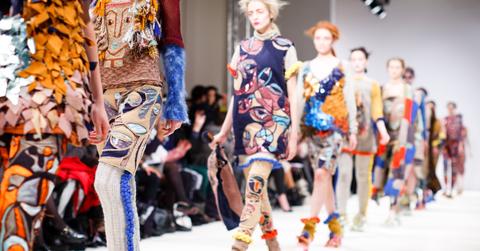In New Fashion Fad, Style Merges With Sustainability
Fashion weeks and businesses are increasingly fusing environmental responsibility with stylish clothes. Have we entered a brave, new ethical world for the fashion industry? This path is great for consumers and the planet alike.
Updated May 24 2019, 3:53 a.m. ET
Historically, sustainability and style have rarely shared the same stage. Much public scorn has been heaped on the fashion industry. Whether shining a spotlight on fabrics made with unsustainably grown materials, condemning child labor and sweatshops, protesting the fur industry or calling labels sizeist for only employing the skinniest of skinny runway models, there’s no shortage of criticism over fashion’s short-fallings when it comes to health, the economy, animals, and the environment.
But there’s a change afoot and it’s centered around treading a bit more gently on the planet and its inhabitants.
The fashion industry is catching up to the environmental movement, with Africa’s largest textile trade fair choosing sustainability in clothing as its 2017 theme, and organizations like Nest connecting designer labels with artisan cooperatives all over the world.
African fashion week shines a spotlight on sustainability.
Ethiopia’s Africa Sourcing & Fashion Week is scheduled for Oct. 3 to 6, with this year’s theme being sustainability in clothing. A conference held at that event will explore how to incorporate sustainability initiatives into the textile industry's certifications, the environment, and production. H&M will be among those companies presenting sustainable solutions at the conference.
African Sourcing & Fashion Week is the continent’s largest textile trade fair. The event features fashion, accessories, home collections, and decorations on display. The event also provides a meeting place for members of the east African textile industry, garment manufacturers, printers, ink companies, and more.
Putting sustainability at the forefront of this year’s Africa Sourcing & Fashion Week speaks volumes for the pulse of the industry these days. Consumer demand for ethical fashion pieces is now driving the market. Designers, producers and suppliers are stepping into line to meet that demand, and media outlets are devoting more space to companies pursuing environmentally and humane practices.
Nest is paving the way for transparency in fashion.
Nest is a New York-based non-profit connecting fashion brands with artist cooperatives to offer working wages to employees and responsibly spun fabrics and clothing to the public.
Fashion is a $30 billion industry and the second-biggest employment opportunity for women in developing countries. Nest’s founder, Rebecca van Bergen, is pushing her organization to bring transparency to those dealings. Nest helps to develop economically depressed areas, preserve artisan traditions, and advocate for female workers so they can support their families with living wages.
“We have seen that with the right design direction, traditional artisan skills are highly transferable to what might be deemed a more contemporary aesthetic,” van Bergen told Harper's Bazaar writer Amy Louise Bailey in a recent interview. By making pieces that are trending in magazines, runways and on city streets, van Bergen is banking on the potential for artisan fashion to be equally as valued and invested in as European textile craftsmanship.
To achieve its mission, Nest has partnered with The Elder Statesman, The Kering Foundation, Maiyet, Mara Hoffman, Nicholas K, and others.
Harper's Bazaar reports that by the end of 2017, Nest will be teaming up with a number of major brands to unveil the first industry-wide standards for ethical compliance. The hope is these goals will bolster consumer confidence in an industry historically riddled with accusations of being more focused on profits than the planet.
